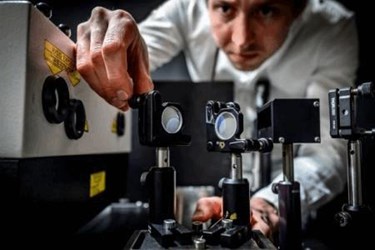Lund Researchers Unveil World's Fastest Film Camera
By Jof Enriquez,
Follow me on Twitter @jofenriq

Researchers at Lund University in Sweden have unveiled the world's fastest film camera. It can capture images at an unprecedented rate of five trillion images per second, which is fast enough to film individual photons as they travel the distance equivalent to the thickness of a paper sheet. This advancement will allow scientists to observe, for the first time, extremely short processes in nature.
Over the last few years, scientists have built state-of-the-art rapid cameras that have the ability to capture very fast biological interactions and chemical processes. A professor at Washington University in St. Louis invented a camera with the ability to capture 100 billion frames per second, a speed capable of revealing light pulses. MIT researchers built one that can acquire visual data at a rate of one trillion exposures per second, fast enough to produce a slow-motion video of a burst of light traveling the length of a one-liter bottle, bouncing off the cap and reflecting back to the bottle's bottom.
Still, the camera more recently developed by Lund researchers has emerged as by far the fastest on record.
The camera is based on a technology called FRAME (Frequency Recognition Algorithm for Multiple Exposures), which is a novel imaging technique wherein the camera sensor may be exposed to light several times before readout is necessary – a completely new feature within the field of optical imaging, according to the project's grant page under the European Research Council (ERC).
"The method involves exposing what you are filming (for example, a chemical reaction) to light in the form of laser flashes where each light pulse is given a unique code. The object reflects the light flashes which merge into the single photograph. They are subsequently separated using an encryption key" on a computer, and then sorted into a video sequence afterwards, states to a press release.
Researchers Elias Kristensson and Andreas Ehn plan to use the new film camera to conduct experiments on combustion, which involve a number of ultra-fast processes at the molecular level. Building off their research, they are hoping to make next-generation car engines, gas turbines, and boilers cleaner and more fuel-efficient.
They foresee researchers in other fields using their ultrafast camera to study chemical or biological process in nature on a picosecond and femtosecond scale.
“This does not apply to all processes in nature, but quite a few, for example, explosions, plasma flashes, turbulent combustion, brain activity in animals and chemical reactions. We are now able to film such extremely short processes,” Elias Kristensson said of the pair’s research. “In the long term, the technology can also be used by industry and others.”
